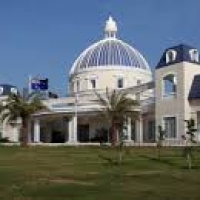Indus International School in Pune, Maharashtra Admission, Fees Structure

Where is Indus International School ?
Indus International School is Located in Pune , Maharashtra, India
Address of Indus International School, Pune
Bhukum
Tal. Mulshi
Pune-412115
Maharashtra
India
+91-2039172227
+91-2039172000
admissions@indusschoolpune.com
How do I contact Indus International School?
Call at +91-2039172000 to contact Indus International School
About Indus International School
Indus International School has been awarded the White Swan Education Award for India’s most influential brand in education 2015-16. It was a vision as encompassing and nurturing as River Indus itself. With his foresight and conviction on universalism of human values, the Indus International School, Bangalore was established on the 14th of July, 2003. Currently, it is counted among the top boarding schools in India. To create global citizens and leaders of tomorrow through the traditional values of love, empathy, discipline and respect – 21st century citizens who think globally and act locally. To create thoughtful leaders through holistic education and lifelong learning. IB World has recently acknowledged General Ray as one of the six IB World School Leaders for rethinking education and making a high-quality education affordable to the underprivileged. Education World has named him one of the 50 game-changers in the education scenario in India. He was also awarded the White Swan Education Award for the ‘Most Influential Leader 2015-16’, in India. With his radical vision, Indus International has become an example for schools in Bangalore and throughout the country. General Ray also won the Brainfeed Lifetime Achievement Award (2017-18) for his outstanding contribution to the field of education by elevating standards in imparting quality education to the next generation learners.
05 million while the population of the metropolitan region is estimated at 74 million Situated 560 metres (1,837 feet) above sea level on the Deccan plateau on the right bank of the Mutha river, Pune is also the administrative headquarters of its namesake district In the 18th century, the city was the seat of the Peshwas, the prime ministers of the Maratha Empire and was one of the most important political centres on the Indian subcontinentPune is widely regarded as the second major "IT hub of India" and the top "automobile and manufacturing hub of India".
It is known as the "Oxford of the East" with the presence of a wide range of educational institutions India's first indigenously-run girls' school was started in Pune by Savitribai Phule along with her associate Fatima Sheikh The city has emerged as a major educational hub in recent decades, with nearly half of the total international students in the country studying in Pune Research institutes of information technology, education, management and training attract students and professionals from India and overseas
The Godavari and the Krishna are the two major rivers in the state Marathi is the most widely spoken language and is also the official language of the state Spread over 307,713 km2 (118,809 sq mi), it is the third-largest state by area in India Maharashtra is bordered by the Arabian Sea to the west, the Indian states of Karnataka and Goa to the south, Telangana to the southeast and Chhattisgarh to the east, Gujarat and Madhya Pradesh to the north, and the Indian union territory of Dadra and Nagar Haveli and Daman and Diu to the northwest Nagpur hosts the winter session of the state legislature.
The state has three international airports, Chhatrapati Shivaji Maharaj International Airport (Mumbai), Dr Babasaheb Ambedkar International Airport (Nagpur), and Pune Airport (Lohegaon, Pune) The state is home to three railways headquarters viz Central Railway (Chhatrapati Shivaji Maharaj Terminus), Konkan Railway (CBD Belapur) and Western Railway (Churchgate) The High Court of the state viz.
Bombay High Court is located in Mumbai Prior to Indian independence, Maharashtra was chronologically ruled by the Satavahana dynasty, Rashtrakuta dynasty, Western Chalukyas, Deccan sultanates, Mughals and Marathas, and the British Ruins, monuments, tombs, forts, and places of worship left by these rulers are dotted around the state The state is home to two UNESCO World Heritage Sites: Ajanta and Ellora caves Pune is known as the 'Oxford of the East' due to the presence of several well-known educational institutions.
Nashik is known as the 'Wine Capital of India' as it has the largest number of wineries and vineyards in the country Maharashtra is the most industrialised state in India and the state's capital, Mumbai is India's financial and commercial hub The state has played a significant role in the country's social and political life and widely considered a leader in terms of agricultural and industrial production, trade and transport, and education Maharashtra is one of the most developed and prosperous Indian states and continues to be the single largest contributor to the national economy with a share of 15% in the country's GDP The economy of Maharashtra is the largest in India, with a gross state domestic product (GSDP) of ₹28.
78 trillion (US$400 billion) and has the country's 13th-highest GSDP per capita of ₹207,727 (US$2,900) Maharashtra is the fifteenth-highest ranking among Indian states in human development index